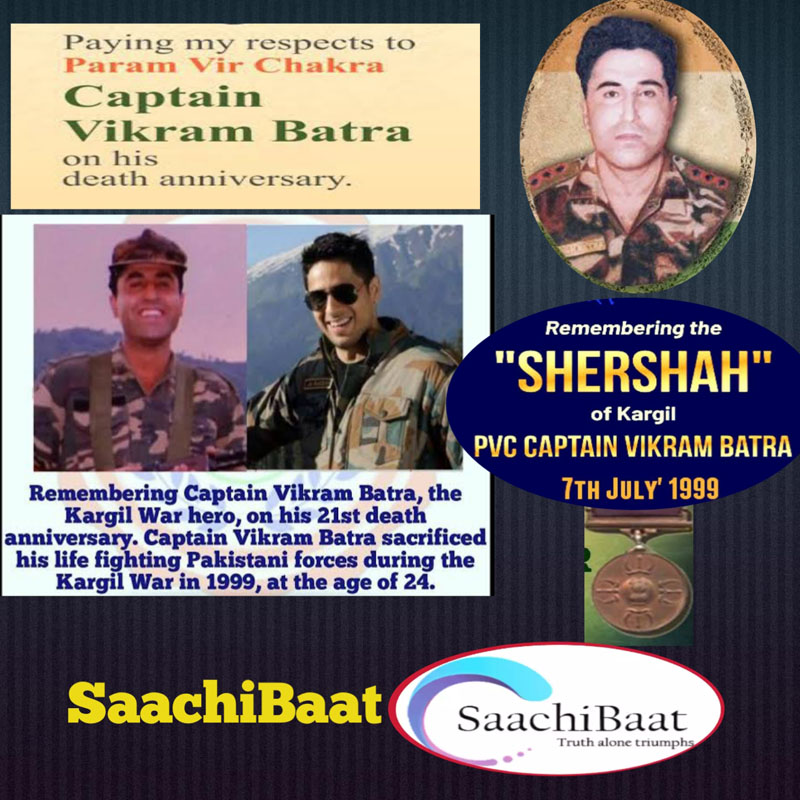Captain Vikram Batra was an officer of the Indian Army, awarded with the (PVC) Param Vir Chakra, India’s highest and most prestigious award for valour, for his actions during the 1999 Kargil War. He led one of the toughest operations in mountain warfare in Indian history. He was often referred to as ‘’Sher Shah’’ (“Lion King”) in the intercepted messages of the Pakistan Army.
Batra was born on 9 September 1974 in Palampur, Himachal Pradesh, India. He was the third child of Girdhari Lal Batra, a government school principal, and Kamal Kanta Batra, a school teacher. He attended the D.A.V. Public School in Palampur, where he studied up to middle standard. He received his senior secondary education at Central School, Palampur.
Later, he attended DAV College, Chandigarh in B.Sc Medical Sciences. At college, he joined the Air Wing of the National Cadet Corps (NCC) while he was in the first year.
During the Inter-State NCC Camp, he was adjudged the best NCC Air Wing cadet of Punjab Directorate in North Zone. He was selected and underwent a 40-day paratrooping training with his NCC Air Wing unit at Pinjore Airfield and Flying Club. During the next two years in DAV, he remained a cadet of the Army Wing of NCC.
He afterward qualified for the ‘C’ certificate in the NCC and attained the rank of Senior Under Officer in his NCC unit.Subsequently, in 1994, he was selected for the Republic Day parade as a NCC cadet, and when he came back home, he told his parents that he wanted to join the Army. In 1995, while still in college, he was selected for the merchant navy at a shipping company headquartered in Hong Kong, but ultimately he changed his mind.
That same year he completed his bachelor’s degree, graduating from the DAV College in Chandigarh.
Following completion of his bachelor’s degree in 1995, he enrolled at Panjab University in Chandigarh, where he took admission in MA English course, so that he could prepare for the “Combined Defence Services” (CDS) Examination. He attended evening classes at the University and worked part-time in the morning as a branch manager of a travelling agency in Chandigarh.
In 1996, he passed the CDS examination and got selected at the Services Selection Board (SSB) at Allahabad.
He was among the top 35 candidates in the Order of Merit. After completing a year (session 1995—96) toward the degree of MA in English, he left the University to join the Indian Military Academy.
In the words of his father, Vikram had found his purpose in life. He had found the way to a righteous path that would lead him to his goal — to a service that was extraordinarily high and supreme.
Batra joined the Indian Military Academy (IMA) at Dehradun in June 1996 in the Manekshaw Battalion. After completing his 19-month training course, he graduated from the IMA on 6 December 1997 and was commissioned as a lieutenant into the 13th battalion, Jammu and Kashmir Rifles (13 JAK RIF). After commissioning, he was sent to the regimental centre in Jabalpur, Madhya Pradesh for further training. The training lasted one month from December 1997 to the end of January 1998.
On completion of this training, he was posted to Sopore, Baramulla district, Jammu and Kashmir, an area with significant militant activity. In mid-March 1998, he was sent to the Infantry School at Mhow, Madhya Pradesh, for the Young Officers Course. This training lasted five months until September 1998. Following the completion of the course and being awarded alpha grading, he rejoined his battalion in Sopore in October 1998.
During his posting in Sopore, Batra had several encounters with militants.
In January 1999, Batra was sent to attend the Commando Course at Belgaum, Karnataka where he excelled. The course lasted for two months and at the end of it, he was awarded the highest grading—the Instructor’s Grade.
After his leave, he returned to join his battalion in Sopore. 13 JAK RIF, after completing its counter-insurgency tenure in Kashmir under 192 Mountain Brigade of 8 Mountain Division, received orders to proceed to Shahjahanpur, Uttar Pradesh. The battalion’s advance party under Maj. Yogesh Kumar Joshi had reached its destination, when on 5 June, because of the outbreak of the Kargil War, its deployment orders were changed and the battalion received orders to move to Dras, Jammu and Kashmir.
Kargil War
The 13 JAK RIF reached Dras on 6 June, was placed under the command of 56 Mountain Brigade, and was given orders to act as reserves to the 2nd battalion, Rajputana Rifles (2 RAJ RIF) during their attack on Tololing mountain. The 18th battalion, The Grenadiers (18 Grenadiers) first attacked Tololing on 22 May, but were unable to capture the peak. 18 Grenadiers made four attempts to capture Tololing, but could only succeed in securing the lower slopes, while suffering heavy casualties.
Eventually, 2 RAJ RIF was assigned the mission of capturing Tololing and they did so on 13 June 1999.
After the capture of Tololing, 13 JAK RIF marched from Dras to Tololing, reaching their destination in 12 hours.Upon reaching, A Coy, 13 JAK RIF took over Tololing and a portion of the Hump Complex from 18 Grenadiers.
Capture of Point 5140
Capture of Point 4875
Captain Vikram Batra, always leading from the front, and fully aware of the great danger of his mission, displayed unparalleled courage and determination in eliminating a Pakistani position at a ledge because he was aware of the importance of his task. His daring assault enabled the completion of the capture of Pt 4875 and this broke the will of the enemy. His courage and action were well beyond the call of duty and he continued to take risks.
Captain Vikram Batra, displayed the most conspicuous personal bravery and leadership of the highest order in the face of the enemy and made the supreme sacrifice in the highest traditions of the Indian Army.
Team Saachi baat salutes the brave son of India!


